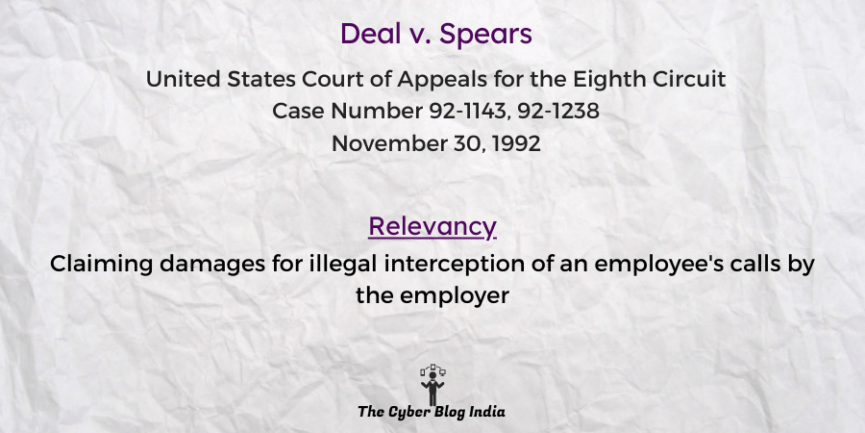Deal v. Spears

Deal v. Spears
980 F.2d 1153 : 61 USLW 2353 : 8 IER Cases 105
In the United States Court of Appeals for the Eighth Circuit
Case Number 92-1143, 92-1238
Before Senior Circuit Judge Heaney, Senior Circuit Judge Ross, and Circuit Judge Bowman
Decided on November 30, 1992
Relevancy of the Case: Claiming damages for illegal interception of an employee’s calls by the employer
Statutes and Provisions Involved
- The Omnibus Crime Control and Safe Streets Act, 18 U.S.C. §§ 2510-2520
Relevant Facts of the Case
- The defendants owns a business and an adjacent mobile home. The telephone in the store has an extension in the home.
- The plaintiff was an employee at the store. She would use the phone repeatedly for personal conversations.
- There was a burglary at the defendants’ store. Suspecting the plaintiff’s involvement, they installed a recording device on the extension phone in the mobile home.
- The plaintiff’s personal conversations, including sexually provocative conversations, were recorded and taped.
- The plaintiff and her partner claimed damages for intentional interception and disclosure of their conversations. The District Court awarded statutory damages of $40,000 and attorney fees while refusing to award punitive damages. The plaintiff has appealed against this refusal, while the defendants appeal against the statutory damages.
Prominent Arguments by the Counsels
- The defendants’ counsel argued that they were exempt from civil liability. The plaintiff consented to the interception of calls she made from and received at the store. Moreover, they are immune from liability for business use of a telephone extension.
Opinion of the Bench
- There is no evidence of express consent in this case. The defendants anticipated that she would not suspect they were intercepting her calls.
- They hoped to catch her admitting to the burglary, an outcome they would not have expected if she had known her calls were being recorded.
- The interception by the recording device was not in the ordinary course of business.
Final Decision
- The court affirmed the District Court’s decision.
Upama Nandy, an undergraduate student at Symbiosis Law School, Pune, prepared this case summary during her internship with The Cyber Blog India in January/February 2023.
